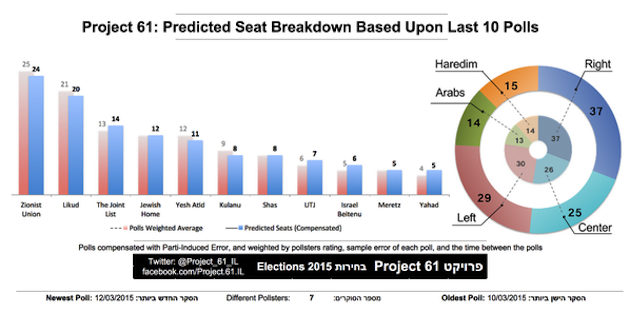Herzog and Livni may have the upper hand over Netanyahu, but even if they win the election, they won’t have an easy time putting together a coalition.

The latest election polls published Friday show Isaac Herzog and Tzipi Livni’s Zionist Camp leading Prime Minister Netanyahu’s Likud party by four seats.
According to Project61, an independent polling project that aggregates and attempts to correct biases in the major pre-election surveys, the Zionist Camp is currently polling at 24 seats as opposed to Netanyahu’s 20 seats. According to Israeli election law, polls are not allowed to be published after Friday.

While the polls certainly reveal a drop in support for Netanyahu over the past few days (the prime minister himself said just earlier this week that there is a chance he will be unseated by Herzog and Tzipi Livni), nothing is certain. And although Herzog has never been stronger throughout the election season, it is anything but clear that he can get Moshe Kahlon’s (formerly of the Likud) Kulanu party to join him, not to mention have the ultra-Orthodox parties sit in the same coalition with Yesh Atid’s Yair Lapid, who in the last government angered the ultra-Orthodox by pushing to draft them into the army.
Currently, a possible center-Left coalition consisting of the Zionist Camp, Yesh Atid, Meretz and Kulanu would garner 48 out of the necessary 61 seats according to the polls. As of Friday night, a potential right-wing bloc, made up of the Likud, Jewish Home, Israel Beitenu and Kulanu was polling at a total of 46 seats.
The two ultra-Orthodox parties — Shas and United Torah Judaism (UTJ) — who are both expected to ultimately be willing to sit in either a right-wing or center-left government, together poll at 15 seats. This could push either of the two potential blocs over the 61-seat threshold. Meanwhile, the Joint Arab List is currently polling at 14 seats.
After the elections, the president will ask all of the parties in the new Knesset to recommend who should be given an opportunity to form the governing coalition. Taking those recommendations into consideration, the president will then select the head of one party, who has 42 days to build a coalition of at least 61 MKs. The president is not compelled to choose the largest party; he can also choose the MK who he believes has the best chances at forming a viable coalition. For example, after the 2009 elections, Tzipi Livni headed the largest party but she was unable to form a coalition so Netanyahu was given an opportunity — and succeeded.
It is likely that the Joint List, led by Ayman Odeh, will recommend Herzog as prime minister. The Zionist Camp, however, supported the disqualification of one of the Joint List’s candidates, raising the possibility that Arab parties will find a way to recommend neither of the major candidates.
And while the Zionist Camp is likely cautiously celebrating its new gains, things are not as rosy in its rivals’ headquarters. According to Haaretz‘s Jonathan Lis, Likud senior officials are labeling the election campaign “a failure” following the polls, and are placing the blame on Netanyahu for the party’s poor showing.
“The Zionist Union will be larger than Likud after the election. This, it seems, is already a fact. The question is what the gap between the two will be. Even if we manage to form the next government, this campaign was a colossal failure. Netanyahu is primarily responsible,” said a senior Likud member.
However, regardless of who wins the election, the Israeli public doesn’t expect much to change vis-a-vis peace talks with the Palestinians. As my colleague Michael Schaeffer Omer-Man wrote earlier this week, a recent poll found that nearly 60 percent of Israelis believe there will be no progress on the peace process regardless of who forms the next government, “because there is no solution to the disputes between the two sides.”


